#this is quite a problem
Explore tagged Tumblr posts
Text
another thing fantasy writers should keep track of is how much of their worldbuilding is aesthetic-based. it's not unlike the sci-fi hardness scale, which measures how closely a story holds to known, real principles of science. The Martian is extremely hard sci-fi, with nearly every detail being grounded in realistic fact as we know it; Star Trek is extremely soft sci-fi, with a vaguely plausible "space travel and no resource scarcity" premise used as a foundation for the wildest ideas the writers' room could come up with. and much as Star Trek fuckin rules, there's nothing wrong with aesthetic-based fantasy worldbuilding!
(sidenote we're not calling this 'soft fantasy' bc there's already a hard/soft divide in fantasy: hard magic follows consistent rules, like "earthbenders can always and only bend earth", and soft magic follows vague rules that often just ~feel right~, like the Force. this frankly kinda maps, but I'm not talking about just the magic, I'm talking about the worldbuilding as a whole.
actually for the purposes of this post we're calling it grounded vs airy fantasy, bc that's succinct and sounds cool.)
a great example of grounded fantasy is Dungeon Meshi: the dungeon ecosystem is meticulously thought out, the plot is driven by the very realistic need to eat well while adventuring, the story touches on both social and psychological effects of the whole 'no one dies forever down here' situation, the list goes on. the worldbuilding wants to be engaged with on a mechanical level and it rewards that engagement.
deliberately airy fantasy is less common, because in a funny way it's much harder to do. people tend to like explanations. it takes skill to pull off "the world is this way because I said so." Narnia manages: these kids fall into a magic world through the back of a wardrobe, befriend talking beavers who drink tea, get weapons from Santa Claus, dance with Bacchus and his maenads, and sail to the edge of the world, without ever breaking suspension of disbelief. it works because every new thing that happens fits the vibes. it's all just vibes! engaging with the worldbuilding on a mechanical level wouldn't just be futile, it'd be missing the point entirely.
the reason I started off calling this aesthetic-based is that an airy story will usually lean hard on an existing aesthetic, ideally one that's widely known by the target audience. Lewis was drawing on fables, fairy tales, myths, children's stories, and the vague idea of ~medieval europe~ that is to this day our most generic fantasy setting. when a prince falls in love with a fallen star, when there are giants who welcome lost children warmly and fatten them up for the feast, it all fits because these are things we'd expect to find in this story. none of this jars against what we've already seen.
and the point of it is to be wondrous and whimsical, to set the tone for the story Lewis wants to tell. and it does a great job! the airy worldbuilding serves the purposes of the story, and it's no less elegant than Ryōko Kui's elaborately grounded dungeon. neither kind of worldbuilding is better than the other.
however.
you do have to know which one you're doing.
the whole reason I'm writing this is that I saw yet another long, entertaining post dragging GRRM for absolute filth. asoiaf is a fun one because on some axes it's pretty grounded (political fuck-around-and-find-out, rumors spread farther than fact, fastest way to lose a war is to let your people starve, etc), but on others it's entirely airy (some people have magic Just Cause, the various peoples are each based on an aesthetic/stereotype/cliché with no real thought to how they influence each other as neighbors, the super-long seasons have no effect on ecology, etc).
and again! none of this is actually bad! (well ok some of those stereotypes are quite bigoted. but other than that this isn't bad.) there's nothing wrong with the season thing being there to highlight how the nobles are focused on short-sighted wars for power instead of storing up resources for the extremely dangerous and inevitable winter, that's a nice allegory, and the looming threat of many harsh years set the narrative tone. and you can always mix and match airy and grounded worldbuilding – everyone does it, frankly it's a necessity, because sooner or later the answer to every worldbuilding question is "because the author wanted it to be that way." the only completely grounded writing is nonfiction.
the problem is when you pretend that your entirely airy worldbuilding is actually super duper grounded. like, for instance, claiming that your vibes-based depiction of Medieval Europe (Gritty Edition) is completely historical, and then never even showing anyone spinning. or sniffing dismissively at Tolkien for not detailing Aragorn's tax policy, and then never addressing how a pre-industrial grain-based agricultural society is going years without harvesting any crops. (stored grain goes bad! you can't even mouse-proof your silos, how are you going to deal with mold?) and the list goes on.
the man went up on national television and invited us to engage with his worldbuilding mechanically, and then if you actually do that, it shatters like spun sugar under the pressure. doesn't he realize that's not the part of the story that's load-bearing! he should've directed our focus to the political machinations and extensive trope deconstruction, not the handwavey bit.
point is, as a fantasy writer there will always be some amount of your worldbuilding that boils down to 'because I said so,' and there's nothing wrong with that. nor is there anything wrong with making that your whole thing – airy worldbuilding can be beautiful and inspiring. but you have to be aware of what you're doing, because if you ask your readers to engage with the worldbuilding in gritty mechanical detail, you had better have some actual mechanics to show them.
#finx rambles#worldbuilding#for writers#honestly I quite liked the asoiaf books I read#it's a well-constructed story! it's a well-constructed world too on its own merits#none of this stuff about grain and spinning is actually important to the story#the problem is that grrm himself seems to just. not realize this#and goes about blithely insisting he's created an extraordinarily realistic fantasy world where all the tax policies make sense#he has not!#he has invited people to tear his creation apart if they can and! it turns out! they absolutely can!#this shit's got no tensile strength! it's made of glue and popsicle sticks!#you're not supposed to put weight on it
5K notes
·
View notes
Text
"I've been waiting for ages for somebody to unmask them."

This moment tends to elicit negative reactions in a first read through, and I've got some opinions about why where Kabru is coming from here actually makes a lot of logical sense. So I thought I'd elaborate on that.
I think people hear this and go, "He thinks they must be hiding something because they gave money to someone? What a cynic." Or "he dislikes them because they did charity?? What's wrong with this guy!". And obviously, a lot, a lot is wrong with him. But I think this makes more sense than it seems at first glance! What people evaluating this judgement miss is why Kabru is paying attention to Laios and co to begin with.
Kabru knows of the Touden siblings because (he's a little bit of a stalker-) he is keeping an eye on all the relevant parties in events developing on the island, in order to be able to guide them to his preferred outcome. This includes adventurers because they are the ones actually exploring the dungeon! He's well aware that something as minor as internal tensions between party members could be key to the historical events that are developing. (He would love the assassination of Archduke Franz Ferdinand.)
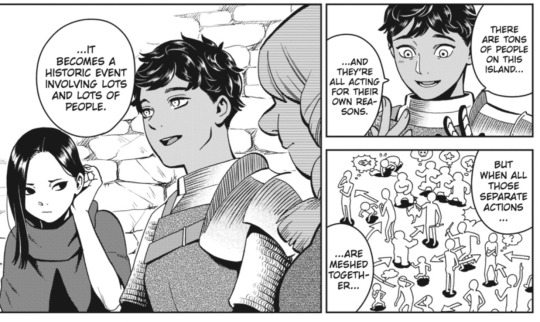
His desired outcome is that whatever the rewards are of breaking the dungeon's curse, whether that's kingship or the ancient elven secrets of dungeons, are claimed by:
A) a short lived person
B) Someone who will be a good, effective leader and/or use those secrets and the power they carry wisely, with foresight, and to establish a political bloc for short lived people.
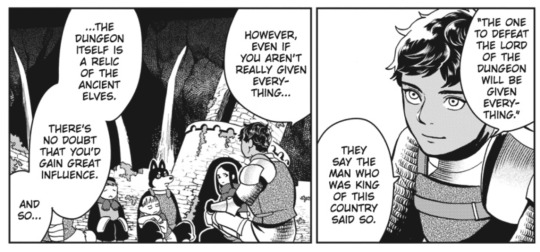
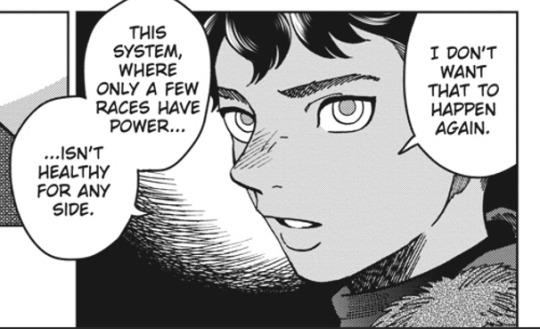
The person he can best trust to do this is, of course, himself. But due to his PTSD regarding dungeons and monsters, he's not able to develop the necessary skills to conquer the dungeon. Once he realises this, he starts looking for someone else who he can support to that end.
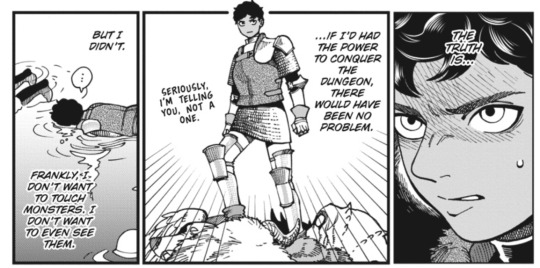
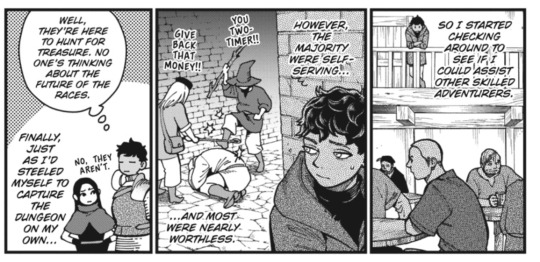
But most of the adventurers don't have any intentions of conquering the dungeon, don't have the skills, or are unsuitable in other ways. In fact, it seems like some potentially suitable people are the Toudens. There are a lot of good rumours about them going around - they actually seem to have a very positive reputation! That's what Kabru means when he says "unmask".

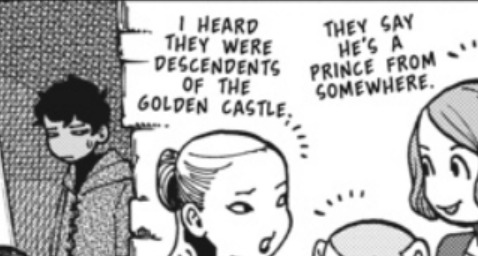

So when Kabru is observing something like them giving money to an old comrade from their gold-peeling days, he doesn't consider it a problem because "they're giving money to this person who doesn't actually need it" or because they must have some dark secret if they act superficially nice. I think he actually understands this situation and what it implies about Laios (in particular) perfectly well.
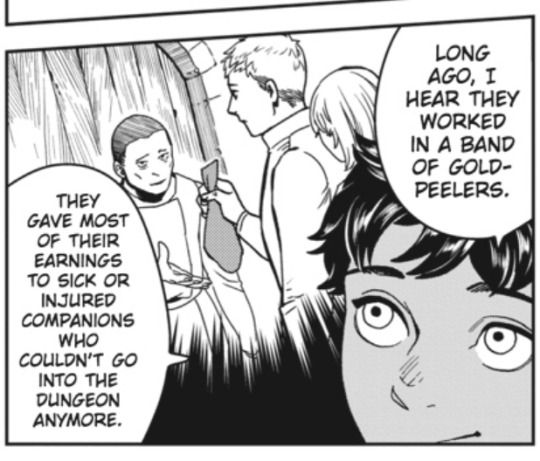
Laios and Falin gave money to an old comrade who got injured and couldn't work. That person then healed up but kept taking their money. Then he used the money to start smuggling illicit goods to the island.
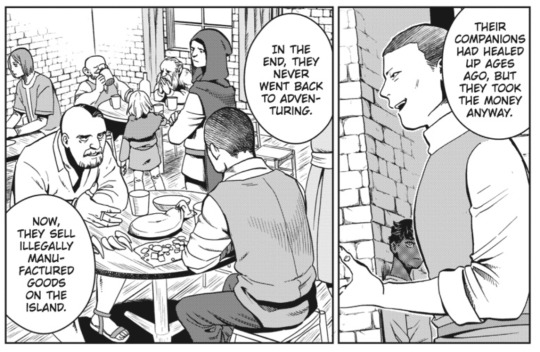
The key is that for Kabru, the problem here is the same as with the corpse retrievers - people using the dungeon's resources to fuel dangerous, selfish, or violent pursuits cause problems for the island, attract more criminals and people with motives other than breaking the curse, and increase the chances of the whole situation ending in tragedy.

Kabru is willing to work with the Shadow Lord of the island if it gets him to his goal - he isn't scrupulous - but the criminal element of the island increasing is something he sees as a major issue.
Also, when you're evaluating someone as a candidate for power, riches, secrets, potentially kingship - then being curious about how the money you give to people is going to be used is kind of a relevant trait!
Interpersonally, Kabru's actually very easygoing - I mean, Mickbell isn't exactly an upstanding guy, is he! But Kabru likes him and they get along well. These traits wouldn't be a problem at all in a friend, or a comrade, or someone Kabru was confident he could use. But he can't get a handle on Laios, and Laios is someone who has the potential to be a major player!
On Laios' end, this is the same as with the marriage seeker who joined their party. She kept asking for things and he gave them to her, because he tries to be nice to others. He even gives her money! It's the exact same thing.
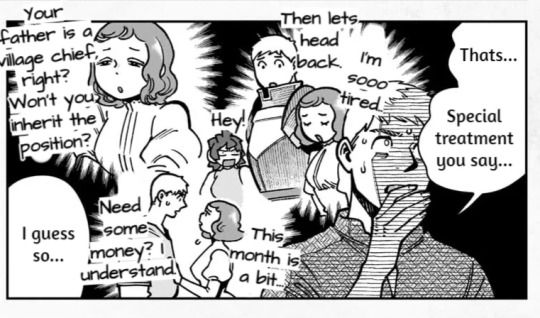
That's fine, but it became a problem because he basically wasn't interested in her motives, didn't notice she was trying to manipulate him, and it also didn't occur to him that the other party members would notice or be affected. We can assume the situation with the gold peeler is the same. When Kabru says that "It's not that they're bad people, they just aren't interested in humans," he isn't wrong.
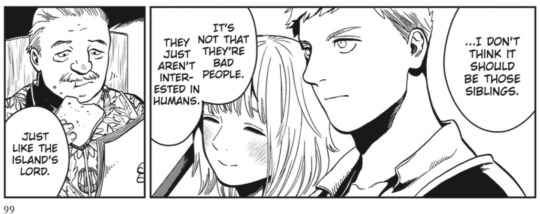
The extent to which this is true of Laios is linked to his autism imo, (because it isn't just disinterest - he genuinely isn't able to notice nonverbal cues that people are lying to him or have ulterior motives) but to a greater or lesser extent I think it's a very common trait. Most people aren't actually that interested in other people who aren't close to them. Kabru is the weird one here. It isn't an issue except as a leader - which is why we see an immediate comparison to the Island's Lord, because that's how Kabru is evaluating them.
And disinterest in/lack of ability with people to the extent Laios exhibits it, it does, actually, make him a worse leader... it's just that as we see in the story, people can help him out. The rest of the party tell him the marriage seeker is taking advantage of him so he tells her he can't give her special treatment anymore. They're pissed and it's a crisis point - he couldn't have recovered their trust without Marcille and Falin - but that's exactly the point. With Marcille and Falin, he was able to recover their trust.
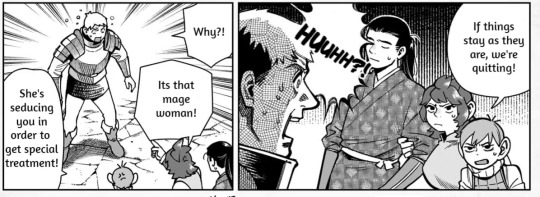
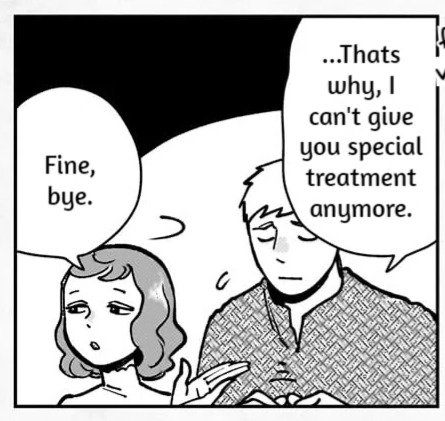
And he has other good traits that make up for it, such as his intelligence, strategic knowledge, open-mindedness and sense of fairplay.
Kabru doesn't disqualify Laios as a candidate based on what he sees about him from afar, though - he still tries very hard to get close to him, obviously hoping that if he manages he can steer Laios to defeat the dungeon and make up for his lack of people-skills in the aftermath. (Which... he does eventually achieve that goal!) He completely fails until the events of the story, so... definitely I think "They just aren't interested in humans" could also partially be a stung reaction to Laios' complete disinterest in him.
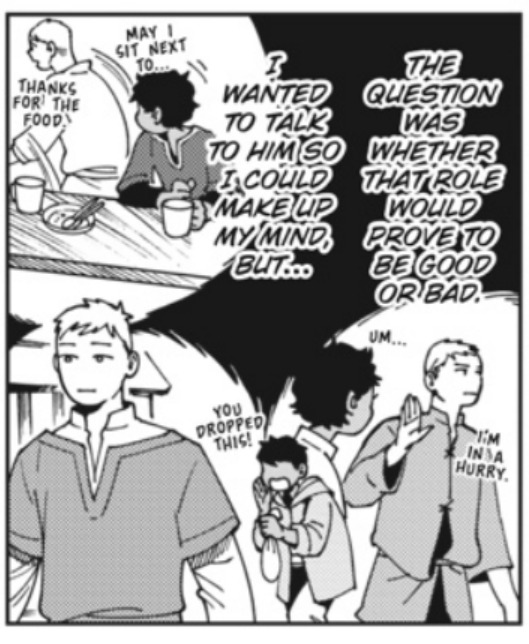
Anyway, that's my read on what exactly Kabru's "issue" with Laios is. Obviously, once he does find out what Laios' true nature is like - about his love for monsters - he develops an entirely new set of fears about Laios' priorities. But since Laios kept that a secret until the start of the story, he has no idea of that yet.
Given all that, I think it's interesting that he says that he doesn't think that the Toudens are suitable to defeat the dungeon, and that he's hoping they'll turn out to be the thieves. As some of his few potential candidates, people who he thinks may play a big role in the island's future, you'd think he'd hope they would be good people!
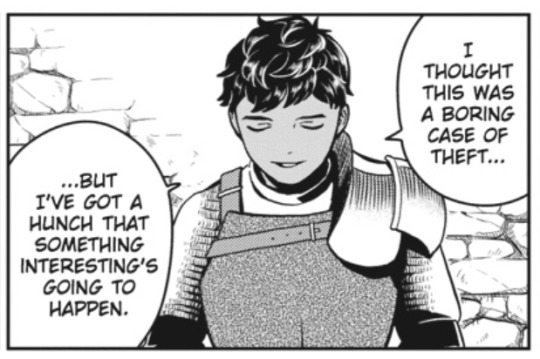
I suppose it's better, in his eyes, because it means that he's involved in something "interesting". They haven't just had their stuff stolen by regular criminals (boring, puts them further away from his goal) - they've been caught up in the beginning stages of "a historic event". The desperate and dwindling group forgetting morals in their quest to retrieve their lost comrade probably appeals to his sense of melodrama. Because he also just... loves drama.
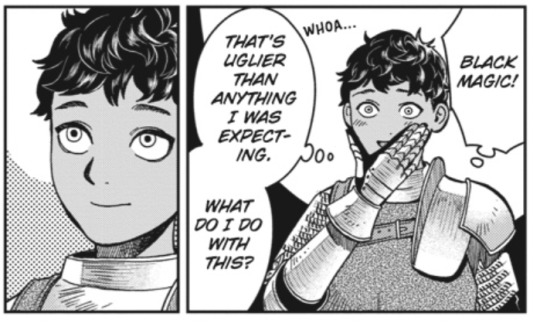
Despite it being "uglier than anything he was expecting", he still pursues Laios as the person he wants to conquer the dungeon pretty much as soon as it becomes clear that he won't be able to do it himself and they are out of time. That's because... well, to be fair, there aren't any other options. And he fits standard A: he's short-lived!
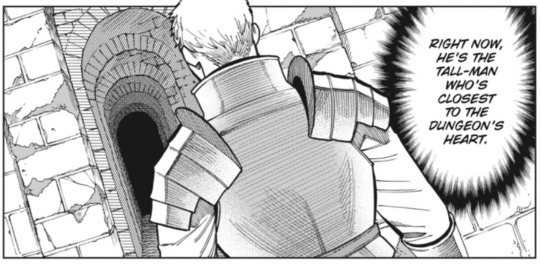
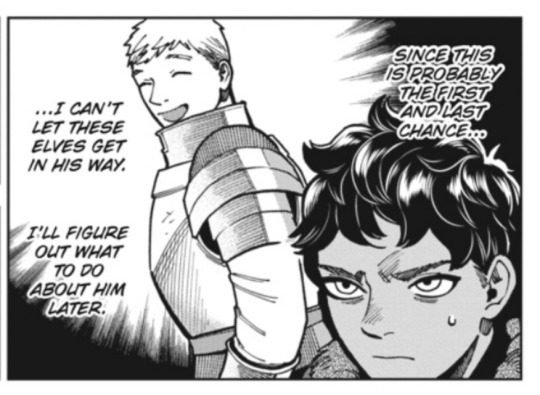
and Kabru still hopes he can fit standard B, too, and be persuaded to use the power he wins for good. No matter how many nightmares he has about Laios, or whether he thinks about killing him. He doubts him, but ultimately he puts his faith in him and seems happy after the manga's ending that he made the right decision.

#dungeon meshi#dungeon meshi manga spoilers#dungeon meshi meta#kabru of utaya#laios touden#labru#laios x kabru#dunmeshi#og post#kabru is such a big picture thinker. and he evaluates people more than he judges them imo#the hater jokes are funny but the people he judges most harshly arent laios and co. they're people like the island's lord.#but you don't see that as clearly because he isn't interested in the island's lord. he understands him. finds him contemptible but useful.#whereas laios lives in his brain rent free because he WANTS to understand him but doesnt quite.#even though he sees the elves as a major threat to his ultimate goals and dislikes the way they treat short lived races#he still understands and evaluates mithrun as an individual based on his own merits#he's one of the characters who is least judgemental in that sense because while he's always making judgements and evaluations#he's also constantly revising them whenever he gets more information#my beautiful machiavellian prince <3#it's genuinely a really laudable way of understanding others imo.#the only problem is that because he's driven towards his goals by his PTSD and survivors guilt#he pushes himself into situations (the dungeon and also interpersonally) that trigger him or even just upset him#without regard for what he authentically wants or his own wellbeing.
4K notes
·
View notes
Note
What’s megatron’s reaction to bee’s sparkling?? And that breakdown’s the father..? I’m curious.
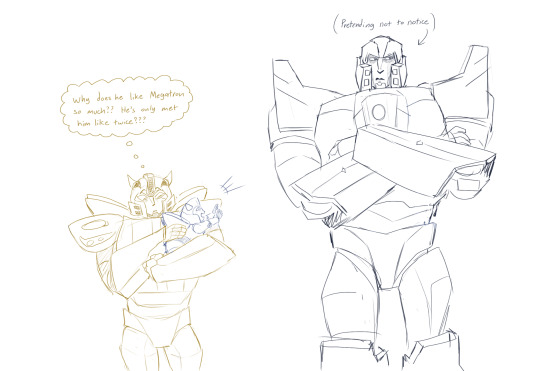
It's not everyday Megatron meets a bot who's not already aware of every wrong he's ever committed. It's not everyday he meets a bot who isn't terrified of him at first, but instead looks at him with awe and wonder.
You can't just reform your entire life/ideals and not go a little soft...
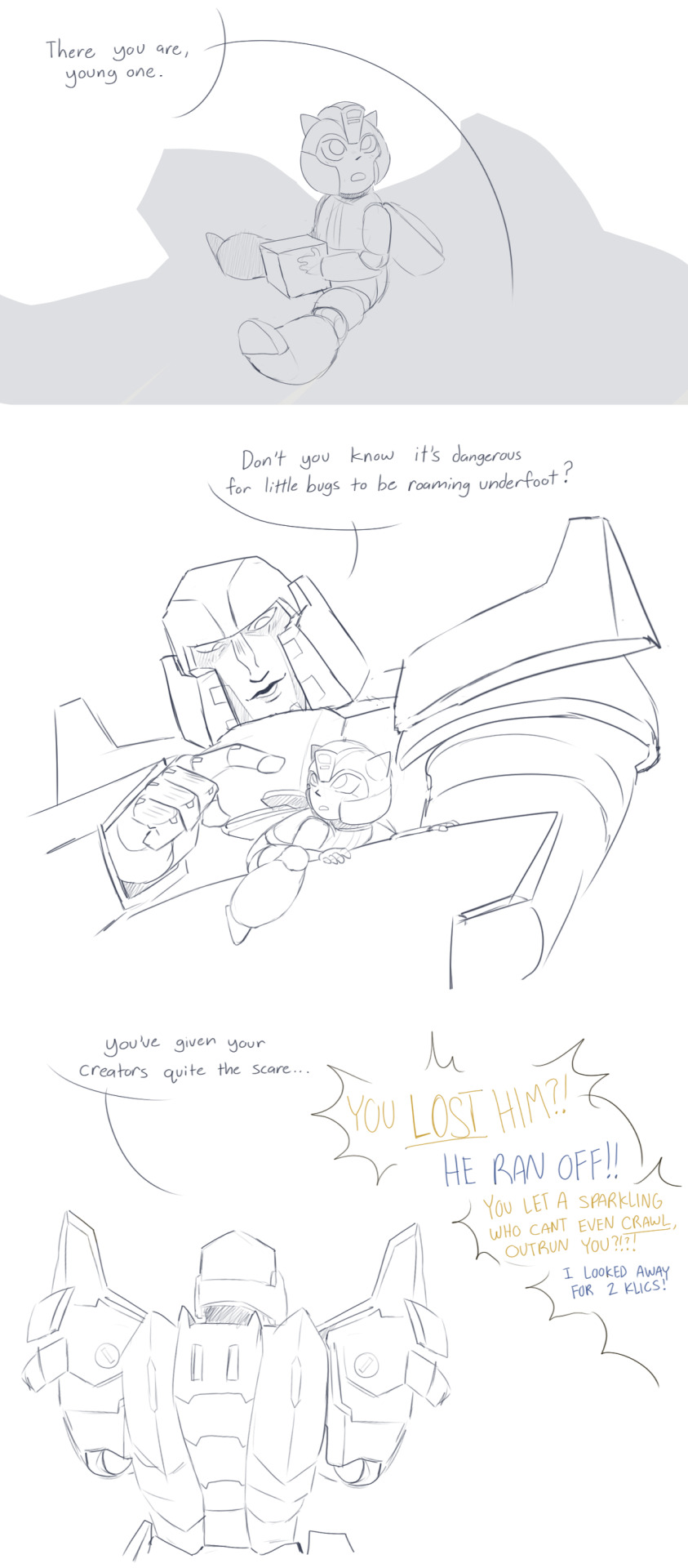
Though, it's important to note that Megatron still has a lot of relationships to repair. Not just with the autobots...
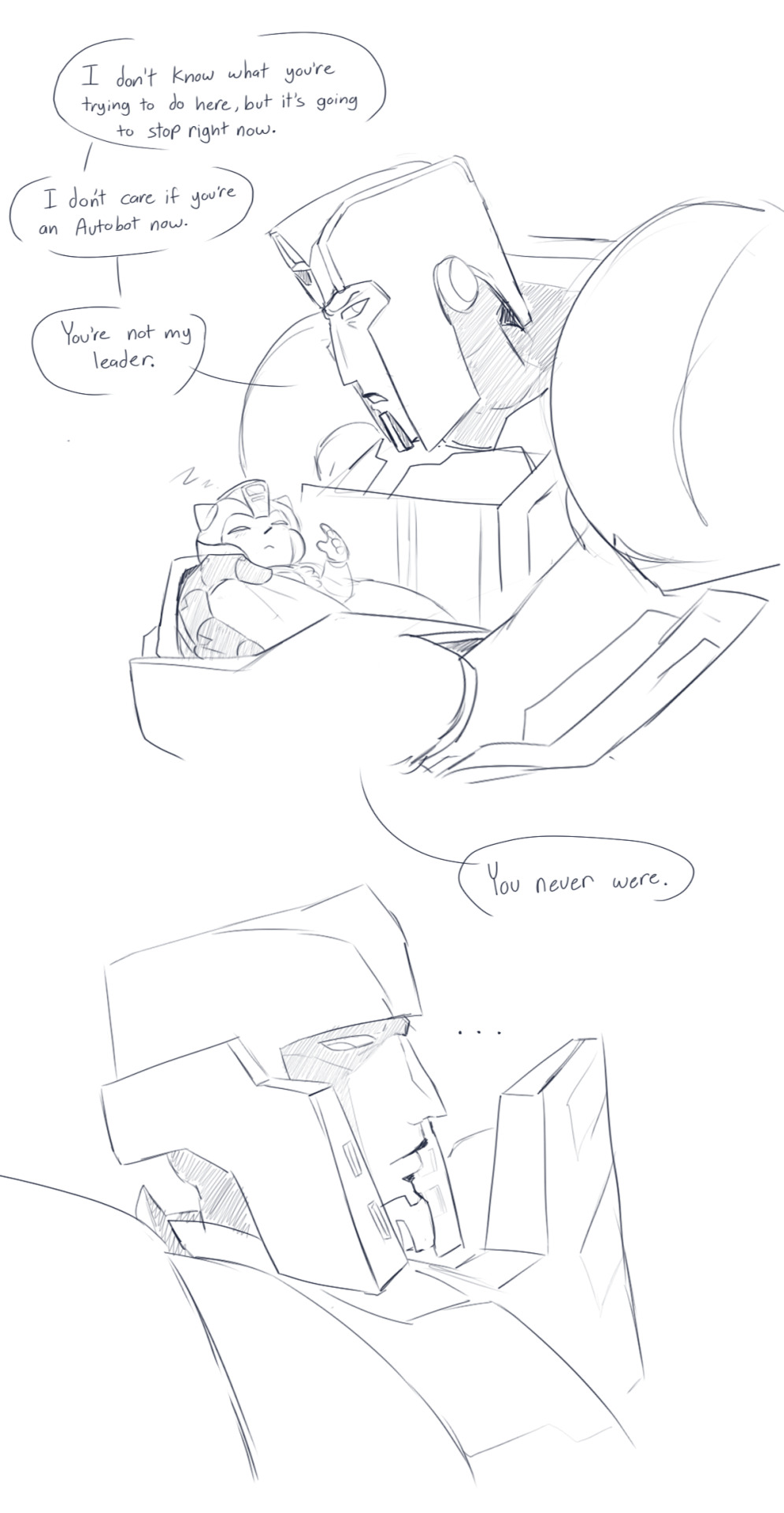
Megatron isn't the only one trying to turn over a new leaf. However, having some recent experience in trying to become a better person, he assumes he can maybe share some advice. Perhaps it was a moment of hopefulness, that he too could be looked at so fondly as Optimus; that he could be looked upon as a guidance figure.
#basically megatron is a little jealous of Optimus and Bumblebee's dynamic#and wants to maybe take breakdown under his wing because he sees so much of himself in him#and maybe if he becomes this fatherly figure to breakdown it will prove that Megatron is capable of being a good trusting person#a small problem is that he wasn't exactly the kindest to the stunticons#and he's not quite sure how to repair that#and Breakcheck is here being cute because I said so#I think Breakcheck could lead to a lot of healing with the Decepticons#like... as a little ambassador baby. a cross-faction proof that peace can exist between them#breakbee#transformers fanart#transformers#transformers bumblebee#maccadam#tf earthspark#tf fanart#tfe bumblebee#tfe breakdown#tfe megatron#megatron#tfe#earthspark#breakcheck#tfe breakcheck#tfe breakbee#breakbee fanchild#idk what to call this au lol#transformers earthspark
2K notes
·
View notes
Text

eidolon.
#submas#i really love the quote “most of all - a ghost is a wish.”#it can really be interpreted in so many ways. and every one of them would be correct.#because a ghost Is a wish. a wish to return. a wish for something familiar. a wish to not be alone. a wish to not be left behind.#the problem with ghosts is that at the end of the night. that's all they are. ghosts. fleeting. temporary. something ideal - not quite true#because a ghost is a wish. and a mere wish won't bring them back.#ha. anywayss. ta!#warden ingo#submas emmet#ingo#emmet#submas angst#my art
694 notes
·
View notes
Text









|| Companion skill animations (+ bonus Rook)
#keeping the bellavrook agenda up by putting them in the same row :)#there was an attempt to keep this coherent colour-wise I promise. it failed but There Was An Attempt#the problem is that you know. I didn't really remember where to find the skill spots#so I recorded the footage all over the place in my run and the light is... quite different everywhere...#emmrich had the worrst of that probably#ANOTHER problem was that the anims wouldn't even trigger at every skill spot. for whatever reason#I have not figured out the logic behind that but I trust that it's there#probably the worst moment was with with bel's skill spots where the anim triggered once but I didn't get the footage#and then I couldn't get the anim to trigger again no matter what.#forgot to mention: the second Rook gif (the penultimate gif overall) is from after you complete an Evanuris altar challenge#dragon age#dragon age the veilguard#flowers.txt#flowers blogs#rook datv#rook dragon age#rook#bellara lutare#davrin#davrin dragon age#emmrich volkarin#lace harding#lucanis dellamorte#taash#taash dragon age#bellara dragon age#harding dragon age#emmrich dragon age#lucanis dragon age#neve dragon age
797 notes
·
View notes
Text

#saying it in the tags isn't enough i need to edit it myself#tcoaal#gravecest#the coffin of andy and leyley#everyone tell ashley she did a very good job saying please this is big for her#this isn't QUITE exactly how canon goes but it is almost exactly how canon goes#siblings with no problems#ray's records
325 notes
·
View notes
Text
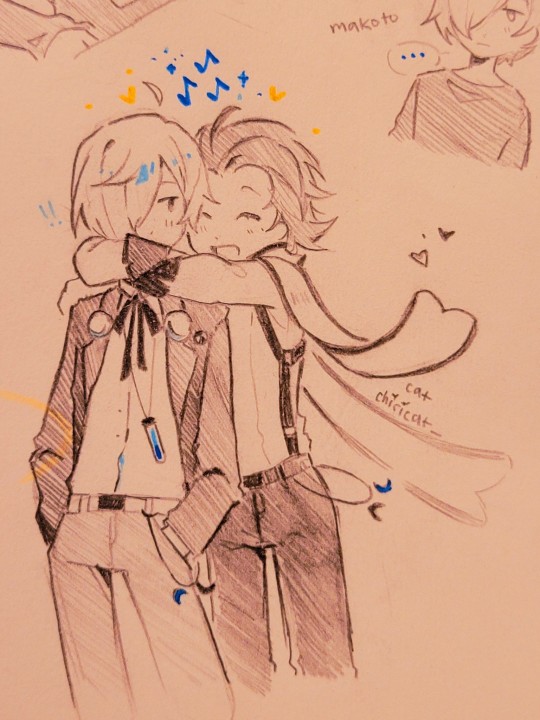

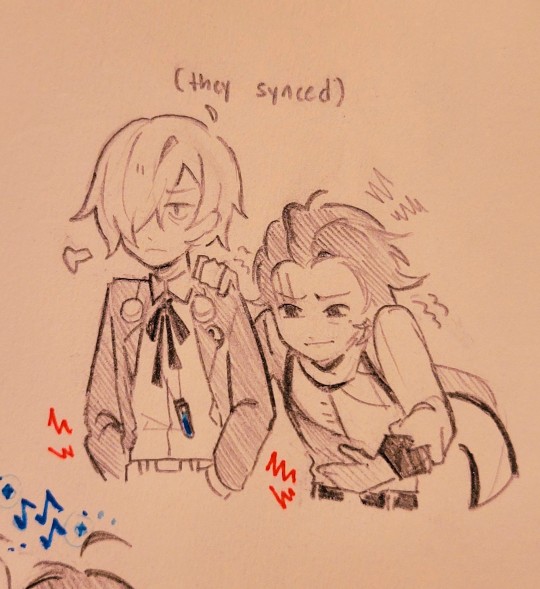
ryomina demons are winning
#does anyone here like them idk. theyre funny#putting off finishing p3re to draw these so i don't have to be sad just yet#cat’s art#ryomina#ryoji mochizuki#makoto yuki#minato arisato#p3#persona 3#p3re#p3 reload#sorry for traditional sketch stuff... idk i just feel like i do better on paper even tho its literally the same style#like i can just get the lines better on paper. i think my brush is probably too thick digitally if i'm having this problem lol#makoto makes me so emo u guys have no idea. i didn't quite get this guy in the beginning but now...#full force understanding of a character. hes. he :( (incoherent sobbing)#tag ramble again SORRY I UEBRO4Y39NRMFMT#oh yeah the period thing going around is so funny. PERSONA 3 PERIOD SIMULATOR
2K notes
·
View notes
Text



#that underwater tear#cinematic masterpiece hhh#also in the first and second gif there is a highlight on silcos eyelid that made me think multiple times his eyes are open#arcane#arcane 2024#arcane spoilers#arcane season 2 spoiler#arcane s2 spoiler#jinx#jinx arcane#arcane jinx#silco#silco arcane#arcane silco#jilco#bombshark#gifs#also since quite a while the quality of my gifs look reeeeaaally crappy on tumblr vs before#it changes from monitor to monitor so I hope its only a problem with my laptop and that it looks decent for all of you :(
478 notes
·
View notes
Text
HAPPY HOMESTUCK DAY U WANT FIC? >:U
It's 4/13 and 4 days ago I finished posting Karkat Vantas vs The Evil Gods, a fic that I've been percolating for more than a decade and am very proud of, and which readers so far seem to have quite enjoyed! So this is me enthusiastically doing jazz hands at my baby. HEY THERE MY FRIEND DO YOU LIKE
1. Humanstuck, vigilante/superhero AUs, eldritch gods, possession/exorcism, religious horror, hurt/comfort and drama?! Alternia City as Basically Gotham?!




2. Riffs on the Winter Soldier/Turns Out The Guy You Love's Not Dead But He Came Back Wrong?! People slowly recovering from horrible dehumanization and learning to be people again through the power of many different forms of support and love?! People negotiating messy poly situations?! Pale Gamkar, even, perhaps?!




3. Copious shenanigans of Space and Time?! The ever-increasing urge to beat Doc Scratch's smug little "Hee Hee Hoo Hoo" ass with your bare fists?! Goddessdemonangel in a sundress?!





3. Ensemble casts whose backstories could sustain multiple spin-off fics each?! And the personnel forms I fabricated and filled out for every single one of them because I've lost control of my life?!












WINTERSOLDIERSTUCK WEDNESDAY WSUNDAY BE UPON YE. If you've been on the fence please consider checking out my huge and fully-illustrated brainchild (with an eye to the tags and warnings of course) because I had a lot of fun and think it turned out pretty sick! Thank you for attending my TED talk.
#Homestuck#......god this post and fic has every fucking person in it. do I. do I tag them all. that seems obnoxious. >:I hmmm.#Karkat Vantas#Davekat#Gamzee Makara#Dave Strider#Gamkar#humanstuck#this is the same problem I hit trying to tag it on AO3 I genuinely don't know how to figure out who to tag and don't want to tag like 50 pp#Because like I mean shit just if I pick out people with major parts in multiple scenes throughout the fic it adds#Feferi Peixes#Dirk Strider#Kanaya Maryam#Tavros Nitram#Rose Lalonde#Aradia Megido#Equius Zahhak#Terezi Pyrope#and where the heck is the cutoff because bunch of other people are in a ton of scenes without being quite as active in the plot?? >8Ic#I'm. Struggling. And it's time for me to go to bed. I am going to queue this and stop worrying about it haha.#KVvTEG#Splickedydoodles#Splickedydrabbles
215 notes
·
View notes
Text








Chalk eating!
#deltarune#deltarune fanart#kris deltarune#kris dreemurr#soul deltarune#susie deltarune#noelle deltarune#noelle holiday#suselle#awww shes trying to impress her guys#lets go cheer her up!!!#it is a quite mystery how Susie can eat it w no problem#also my sister suggested that Kris' chalk should be green#cuz moss is green and Kris eats moss#this is fukcing genius#gonna thank my friend for giving me this idea#my art
169 notes
·
View notes
Text
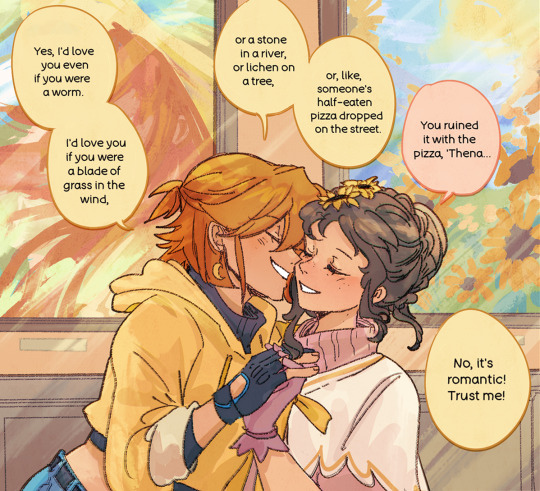
day 10: love is devotion ♡
(femslashfeb prompt list)
#minifemslashfeb2024#ace attorney#junithena#athena cykes#juniper woods#melts into a puddle#junithena WARM junithena SOFT#junithena is so darling to me especially the version of it I made up in my head#ok I always write junie with imposter syndrome BUT#can we talk about how many skills this girl has. she can knit. she can sing. she can write. she can garden. she's smart#AND she's studying law to become a judge#I made her a painter for this too. because why not#god gave her health problems to nerf her. otherwise she would be too powerful#also athena short hair swag because I think she looks cute like that#do you ever think about the space and earth symbolism? no? just me?#is there something quite so intangible as falling in love with the stars#believing you will never reach them#when the stars are shining brightly to guide your way#they shine just for you...#mini be normal about junithena challenge: failed#'what are you talking about' shhh. shh.#you are safe now my sweet child
2K notes
·
View notes
Text
do yall ever think about bruce/batman!clone danny standing in front of his bathroom mirror after finding out he was a clone and silently tracing his face. The slope of his jaw and point of his chin. The high angle of his cheekbones and the shape of his eyes, the curve of his brow bones and the shape of his nose. The volume of his hair and the way it curls and gets fluffy when it gets too long.
His hair is black the same way a crow's wing is black. His dad's hair is black the same way a black bear's fur is black. His dad's eyes are blue like the ocean is blue. Danny's eyes are blue the same way a glacier is blue.
His dad has a square jaw and straight flat hair, and he tans and gets a face full of freckles when he's out in the sun for too long. Danny burns like a lobster and his face remains untouched. Danny has a sharp jaw and tall cheekbones, and Sam says when he's not smiling there's almost something regal about him. You would never call Jack Fenton "regal" when he's not smiling.
Sam says when he's not smiling he looks scary the same way a stone statue is. Jack Fenton when he's not smiling looks scary the same way that german shepherd staring at you across the street is.
Do you ever think he grew up wondering if he was adopted. Because of course, he has black hair and blue eyes like his dad. But having the same color doesn't make you someone's child.
Or, worse, things he's heard from the other kids and the other parents and even some of his teachers growing up; that he was the product of an affair. And that his dad was just too stupid to notice. And Danny would defend his parents until the day he died, because Jack Fenton wasn't an idiot and Maddie Fenton wasn't a cheater.
But doubt comes in with fickle tongue. his parents swear up and down that he is their child when he asks about either. That Danny just had his grandparents' features, but he was their son and they loved him.
But Danny doesn't look like either of his parents. His mom's eyes are blue like an aquamarine and Jazz's too. And they burn like lobsters in the sun too, but Jazz gets freckles on her face and so does Maddie. And as Danny grows up he doesn't bulk up or get stocky like his dad did, and when he hits puberty he doesn't shoot up like a tree like Jack Fenton did.
He stays small, and they say he's a late bloomer (and he is), or that he just has his mom's height. But he's fast and has good stamina, and some days it feels like he's built entirely different from his family. That the things they went through growing up just didn't apply to him. Jack and Maddie Fenton both had acne and breakouts when they hit puberty, and Jazz inherits it and he's seen the amount of skincare products she keeps on her side of the bathroom.
And then he hits puberty and breaks out maybe once or twice, but his skin stays clear for the most part and the problems and changes his dad went through just don't happen to him.
And the truth is worse than all of the lies.
How horrifying.
#dpxdc#danny fenton is not the ghost king#dp x dc#dp x dc crossover#dpxdc crossover#dpdc#danny fenton is a clone#clone danny fenton#clone danny#thinking about the inherent trauma that comes with growing up as a clone and not knowing and questioning everything about yourself#thinking about the amount of effort and lying that Jack and Maddie would've had to to do if they wanted to pass Danny off as their bio son#the MEDICAL RECORDS#danny's medical history is completely different from theirs. any generational health problems the waynes have would/could be passed down to#danny and he's completely oblivious to it up until the reveal. he'd have no idea about any medical risks until they hit him before that.#so many little things and inconsistencies that would just build and build and build until it finally came to a head and the truth came out#forever and ever and ever fascinated by the underlying horror of being a clone. there's a horror in being cloned but there's also a horror#in BEING a clone. like yes he could've always known from the start and that comes with its own set of issues BUT. just. him not knowing#for the longest time. the lies and deceit and betrayal. you know how adopted kids come out and talk about how they didn't know they were#adopted for the longest time and how traumatizing and betrayed they felt when they're finally told 15-20 years down the line? yeah that#i imagine finding out you're a clone is a lot like that.#i read a book in middle school once abt a girl moving to a new town with her family and getting these horrible nightmares and noticing how#everyone was acting strange around her. one of her nightmares was about the 30yo police officer being a shambling corpse talking to her#and at the end of the book she finds out she's actually the clone of a dead older sister and the police officer was her sister's boyfriend.#and she was in gymnastics but quit and her parents were so disappointed bc the og sister was a champion/award winning gymnastics player#and i never did finish the book but god am i reminded of that.#i love reading the dpxdc clone danny posts and they usually have him brush off being a clone which is literally totally fine but duUUDE#just imagine his own horror over it. its SOOO good
649 notes
·
View notes
Text

Get the wormies!!!! Now!!!! Get them!!!!!
#isat#in stars and time#isat spoilers#isat siffrin#isat loop#isat isabeau#2hat spoilers#twohat spoilers#isaloopfrin#or should I say... loopfrinisa.....#to me it's isaloopfrin. their proper cuddling order. loop is very warm in my heart#anyways. Isabeau is not touching anyone here#even if it seems like it. And his desing isn't correct either#memory problems maybe#something something you don't see him as a person but a character in a play something something#also why his face is hidden#actually I also wanted to draw star form loop. but I couldn't for the life of me figure out how to do a sideview of them. so human Loop!!!#actually I want to say a lot more but. um. i yapped quite a lot already.#also the quality of my camera is shit. and I don't know how to take pictures. so sorry for that#anyways thats it
288 notes
·
View notes
Text
Chat, I regret to inform you that I have added a new hyperfixation…so…
Agatha All Along Incorrect Quotes!
Alice: Hold the fuck up.
Also Alice, crawling into Lilia’s lap: It’s me. I’m the fuck up. Hold me.
Rio: I have an idea!
Jen: No murder.
Rio, sighing petulantly: I no longer have an idea.
Lilia: I have a bad feeling about this…
Agatha: What do you mean?
Alice: Don’t you ever get that little voice in the back of your head that tells you if something is going to get you in trouble?
Agatha: No.
Jen: That actually explains so much.
Lilia: As far back as I can remember, I’ve always had this little voice in my head telling me to “live it up today, because there’s not gonna be a lot of tomorrows”.
Agatha: You do realize there’s medication designed to get rid of those kinds of voices, right?
Teen: A bird flew in through my window and I’m trying to befriend it.
*later*
Agatha: Why don’t you quit bothering me and go talk to your bird friend?
Teen: Matthew and I are not speaking at the moment.
*the coven, huddling together behind a makeshift shelter to shield themselves from repeated gunshots*
Alice, hastily shoving the others behind her so she can return fire: Agatha, do you have any idea who would want to shoot you?!
Agatha, squashed between Jen and Rio: Many people want to shoot me. I take great pride in that!
Jen, glaring at the group as she hands over bail money:
Alice, tapping her shoulder: What about Teen?
Jen, glaring more: I’ve got to bail him out too? Where’s Agatha?
Teen: No one called her. We used Lilia’s phone call to call Alice and Rio’s to call you. Then Rio used my phone call to vote for American Idol.
Rio: :)
Jen: Rio isn’t answering her phone.
Agatha: Here, I’ll try.
Jen: Alice and I have tried six times each, what makes you think that-
Rio, picking up on the first ring: Hey, sweetheart.
Agatha: The ends always justify the means!
Jen: Do you know who said that?
Agatha: Was it Oprah or someone nice and great like that?
Jen: It was Machiavelli. A decidedly non-Oprah like person.
Jen: I bet you didn’t even finish the thing I asked you to get done!
Agatha: For your information, I most certainly did! Got it done last night!
Teen, whispering to Agatha: You didn’t get it done, did you?
Agatha, whispering back: I don’t even know what she’s talking about.
Lilia: I am at a loss for words!
Teen, glancing at the camera like his mom like he’s on The Office: Despite being lost for words, Lilia yelled at us for the next 45 minutes.
Agatha, carrying Señor Scratchy out of the room:
Señor Scratchy: *snuggles under her chin*
Agatha, kissing his head: You are being punished. Please stop being adorable. I love you.
Teen: I got a trampoline tent for summer sleepovers!
Jen, whispering to the other adult witches: …think of all the sex.
Alice: There are two types of people.
Rio: If you wanted to eat someone, you could put a fire under it and slowly roast them :)
Lilia: …three. Three types of people.
Jen, cautiously: I can’t believe I didn’t notice this before, but…Teen, you are a little crazy.
Teen: Aren’t we all a little crazy here, Jen?
Jen: No, I mean you’re aging-ballerina, child-chess-prodigy, professional magician kind of crazy.
Teen: It’s my mom’s fault. You know, we come from a Jewish family, but she used to tell me the reason Santa didn’t come was because my room was too dirty.
Rio: I’ve come looking for trouble. And if I can’t find trouble, I WILL create some.
Alice: Do you trust me?
Lilia, smiling proudly at her: Yes.
Alice, who has been completely panicking: Wait, what? Why?!
Agatha, awkwardly glancing around for help: Er…Alice, I’m gonna be honest, I don’t know what to say to people who are crying. So I’m just gonna hope that the tone of my voice makes you think I do, okay, sweetie?
Alice, sniffling: …thanks, Agatha.
Agatha, patting her on the back with a bit too much enthusiasm: No problem, kid.
Lilia: I told Agatha about it weeks ago!
Teen: She WHAT?
Agatha: What??? Lilia says insane shit all the time, how was I supposed to know this one was true?!
Lilia: Bank accounts are a sham created by the shadow government!
Agatha: SEE?!
BONUS:
Wanda, watching from the afterlife: so…when exactly do kids grow out of that whole emo, rebellious stage?
Lorna, shrugging: I don’t know. Alice is still in it.
#agatha all along#agatha harkness#rio vidal#lilia calderu#jennifer kale#alice wu gulliver#teen agatha all along#billy kaplan#señor scratchy#agatha all along spoilers#Agatha all along incorrect quotes#alice “mommy issues” wu gulliver#agathario#we love our dangerous lesbians#we were robbed of alice getting to use her ex cop skills and I’m salty about it#agatha is a problem child#rio is a menace to society#they left her in jail#she broke out#I think I’m funny#found family#mentions of wanda maximoff and lorna wu#alice needs a damn hug#and so does teen (I can’t call him billy quite yet I don’t know why)#lilia is the friend-turned-mother-figure that alice and teen both desperately need (sorry agatha you don’t count right now)#tw: sex jokes#tw: violence jokes#really just tw: rio vidal#sometimes family is a traumatized teen; the stressed witch he designated as his pseudo mom; her psycho ex wife; her mlm friend;#a reluctant nepo baby with depression; and the crazy psychic grandma they found on the side of the road
416 notes
·
View notes
Text


good evening
#liam biting off a glove while on top of sherly has lived rent free in my head for months#Sherly should bite the other glove off for Liam#IVE MISSED DRAWING THEM SCREAAAAMSSSS#oh it’s been a while since the peak drawing yaoi hours until 3am have hit me#sherliam#yuukoku no moriarty#oh to be sat on by William James moriarty#I do not have a glove biting problem I totally don’t uh huh#I know I draw this angle or situation quite a lot#but it’s not my fault Sherly looks good on the ground under Liam#ynm sherlock Holmes#Liam James moriarty
344 notes
·
View notes
Note
Bill, Bren, & Blaw - I'm surprised they're not collectively known as "The B-sides"
(in reference to original character Killie's father, uncle and aunt.)
That's a great idea, I bet they could've been in their wild youth. They were definitely inseparable.





there's no bond on earth like siblings who murder a guy and cover it up together.
#killie#it's always WHY did you murder that guy and HOW did you murder that guy and never HOW DID YOU MANAGE TO GET AWAY WITH IT?#how did three extremely small young children pull that off? THAT was the hard part. especially because they had fully committed#to not involving any adults at all. and once you've committed to that it becomes extremely difficult the further you go to change course.#people don't appreciate this enough! the logistics! it was very stressful for Bill! he had a lot to manage! and he never got ANY credit!#The Saint turned out to be squeamish! Blaw turned out to be bloodthirsty! Corpses of full-grown normal-sized adult men#are actually quite difficult to move! on a normal day for other adults! this was a bloody big series of problems!#he had matchstick arms and weighed as much as a sparrow's fart and there were time pressures as well??#AND YKNOW IT WAS 1950s or 1960s IRELAND AND WE WERE ALL VERY POOR... MUMBLE MUMBLE UPHILL BOTH WAYS KIDS THESE DAYS HAVE NO IDEA.#WITH THEIR FACEBOOKS AND THEIR MOBILE PHONES AND THEIR YOGURT DRINKS. BACK IN MY DAY WE HAD TO MURDER OUR OWN BUGGERS ALL BY OURSELVES AND#GET RID OF THE BODY AND ARRANGE A CREDIBLE-LOOKING RATIONALE AND ALIBIS AND ALL. AND NOW EVERYBODY'S GOT ADHD AND THERE'S THE EURO AS WELL.#NONE OF YOUS COULD MURDER A MAN ANY MORE. YER LOSIN THE SKILLS
186 notes
·
View notes